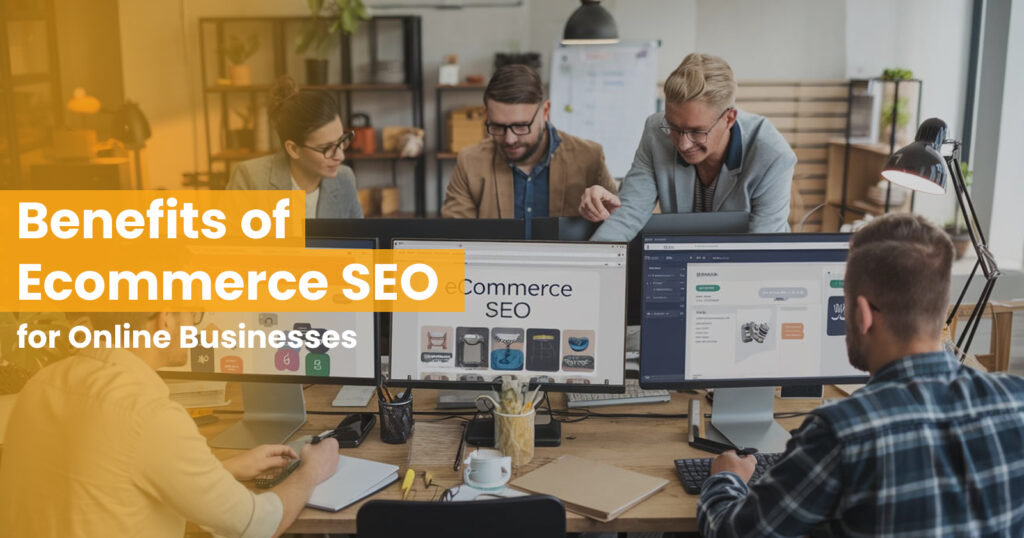
In today’s highly competitive digital marketplace, ecommerce SEO is not just an option it’s a necessity. If you’re running an online business, having a well-optimized website is crucial for attracting the right customers and driving sales. SEO (Search Engine Optimization) ensures that your ecommerce store is visible on search engines like Google when potential customers search for the products you offer.
In this guide, we will explore the benefits of ecommerce SEO and how it can significantly impact your business growth. We will also touch on specific aspects like SEO for fashion ecommerce and technical SEO for ecommerce to give you a well-rounded understanding of how SEO applies to different sectors.
What is Ecommerce SEO?
Ecommerce SEO refers to the process of optimizing an online store’s website to rank higher in search engine results pages (SERPs). This includes everything from optimizing product descriptions, meta tags, and images, to improving site structure and speed. A higher ranking increases visibility, drives more organic traffic, and, ultimately, boosts sales.
Top Benefits of Ecommerce SEO

1. Increased Organic Traffic
One of the most significant benefits of ecommerce SEO is the increase in organic traffic. When your site ranks higher in search engines for relevant keywords, more potential customers find your products without you having to pay for ads. Unlike paid search, organic traffic doesn’t come with recurring costs, making it a cost-effective long-term strategy.
For example, if you’re running a fashion ecommerce store, ranking for keywords like “affordable summer dresses” or “trendy winter boots” can drive thousands of potential buyers to your site, leading to increased sales.
2. Higher Conversion Rates
SEO does more than just drive traffic; it attracts qualified leads. These are people who are actively searching for products or services similar to what you offer, making them more likely to convert into paying customers. By optimizing your content for relevant keywords, you ensure that you’re reaching people who are ready to buy, leading to higher conversion rates.
3. Improved User Experience (UX)
Good ecommerce SEO practices inherently improve user experience. Google’s algorithms favor sites that load quickly, are mobile-friendly, and have clear navigation all of which contribute to a seamless customer journey. When users find your website easy to navigate, they are more likely to stay longer, browse more, and eventually make a purchase.
4. Enhanced Brand Awareness
Consistent ranking at the top of search results boosts your brand’s credibility. Over time, potential customers come to recognize and trust your brand, even if they don’t click on your website immediately. As you dominate the SERPs for various relevant keywords, your brand awareness grows.
5. Cost-Effectiveness
While SEO can take time to show results, it’s one of the most cost-effective marketing strategies in the long run. Once your pages are optimized and ranking, they will continue to attract traffic without the need for ongoing ad spend. The initial investment in technical SEO for ecommerce, such as improving site speed and implementing structured data, pays off through sustainable traffic growth.
6. Local SEO Benefits
For ecommerce businesses with physical locations or local delivery services, implementing local SEO can drive traffic from nearby customers. By optimizing for local search terms like “women’s fashion boutique in NYC,” you can capture a niche audience who are ready to shop locally.
7. Better Competitor Insights
Ecommerce SEO not only helps your site rank but also provides insights into what your competitors are doing. With tools like Google Analytics and SEO platforms, you can track your competitors’ rankings, strategies, and the keywords they’re targeting. This knowledge allows you to adjust your own strategies accordingly and stay ahead in the market.
SEO for Fashion Ecommerce

Fashion ecommerce businesses can particularly benefit from SEO due to the highly visual and seasonal nature of the industry. By optimizing for relevant keywords such as “summer fashion trends” or “best winter coats,” fashion brands can ensure that their collections are visible when customers are searching for the latest styles.
Some specific strategies include:
- Optimizing product descriptions: Use keyword-rich, compelling product descriptions that also incorporate long-tail keywords like “bohemian summer dresses” or “high-waisted jeans for women.”
- Image SEO: Fashion ecommerce stores heavily rely on high-quality visuals. Ensure that all images have descriptive, keyword-rich alt text to improve search rankings and enhance accessibility.
Technical SEO for Ecommerce

While content optimization and keyword strategy are important, technical SEO for ecommerce is the foundation of a well-performing site. Technical SEO ensures that your website meets the technical requirements of search engines like Google, allowing them to crawl and index your pages effectively.
Here’s a breakdown of key technical SEO for ecommerce strategies:
- Site Speed Optimization: A slow website can result in high bounce rates, leading to lower rankings. Compress images, leverage browser caching, and use a content delivery network (CDN) to enhance site speed.
- Mobile Optimization: With mobile shopping on the rise, having a mobile-friendly site is non-negotiable. Ensure your site is responsive and offers a smooth user experience across all devices.
- Structured Data: Implement schema markup (structured data) to help search engines better understand your content. This can also lead to rich snippets like product ratings or prices appearing directly in search results, making your listings more appealing.
- SSL Certificates: Secure your website with an SSL certificate. Google favors secure websites (those with HTTPS), and users are more likely to trust and engage with a secure site.
Best Practices for Ecommerce SEO

- Conduct Thorough Keyword Research: Use tools like Google Keyword Planner, Ahrefs, or SEMrush to find the most relevant keywords for your niche. Target both broad and long-tail keywords to capture a wide audience.
- Optimize Product Pages: Each product page should have a unique meta title and description, product descriptions should be rich with relevant keywords, and URLs should be clean and descriptive.
- Utilize Internal Linking: Link to relevant blog posts, category pages, or other products within your site to help distribute authority and keep users engaged.
- Focus on Content Marketing: Create a blog or resource center to share helpful guides, style tips, or buying guides. Not only does this drive organic traffic, but it also positions your business as an industry authority.
- Monitor and Adjust: Use analytics tools to monitor your traffic, rankings, and conversions. SEO is an ongoing process, and regular updates are necessary to stay ahead of competitors and changes in search engine algorithms.
Conclusion
The benefits of ecommerce SEO go far beyond just higher search engine rankings. From increased traffic and conversion rates to improved user experience and long-term cost-effectiveness, SEO is a powerful tool that can help online businesses grow exponentially. Whether you are in fashion ecommerce or any other industry, implementing both content-driven and technical SEO for ecommerce strategies will set your business up for long-term success.
By optimizing your ecommerce store for search engines, you not only attract more visitors but also build a sustainable online presence that continues to grow over time.
Boost your online store’s visibility and sales – let us handle your ecommerce SEO for sustainable, long-term growth!
Frequently Asked Question (FAQs)
Ecommerce SEO is the process of optimizing your online store to rank higher in search engines like Google. It’s essential because it increases organic traffic, enhances visibility, and leads to higher sales without relying solely on paid advertising.
SEO offers long-term benefits such as sustained organic traffic, improved brand visibility, and cost-effective marketing. Unlike paid ads, the results of SEO continue to build over time, leading to better ROI.
Ecommerce SEO focuses heavily on optimizing product pages, categories, and technical aspects like site speed and structured data. Traditional SEO focuses more on broader content strategies, like blogging and link-building for informational content.
Fashion ecommerce SEO often involves a focus on seasonal trends, visual elements like images and videos, and optimizing for mobile shoppers. Keywords are often trend-driven and change rapidly, so fashion businesses need to be more agile.
Technical SEO for ecommerce involves optimizing the website’s infrastructure, including site speed, mobile-friendliness, secure connections (SSL), structured data (schema), and crawlability to ensure search engines can easily index your site.
Typically, SEO results can take 3 to 6 months, depending on the competitiveness of your industry, the keywords targeted, and the overall SEO strategy. The results are long-lasting and continue to grow over time.
